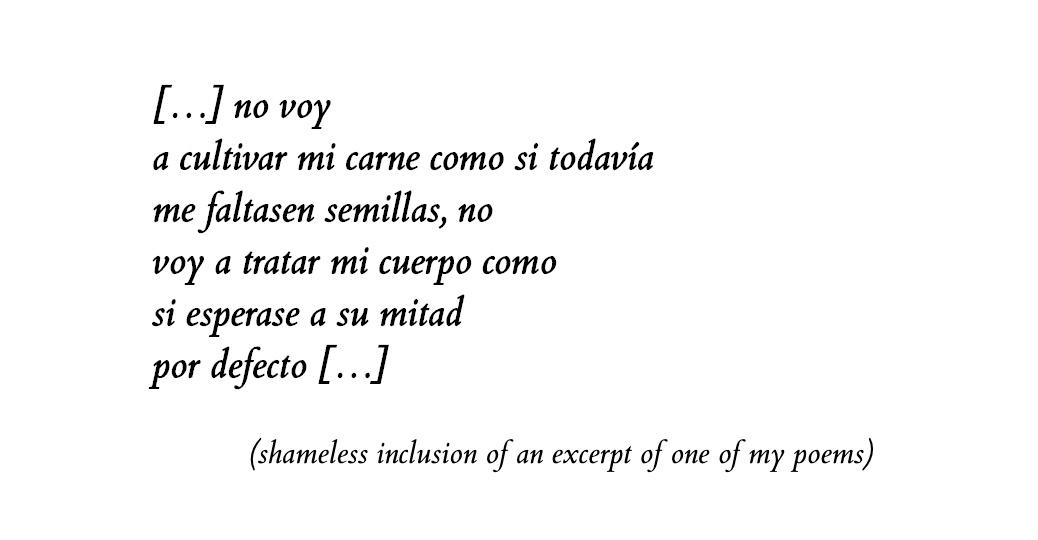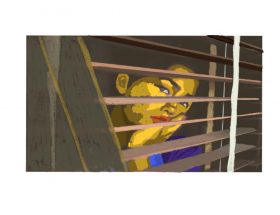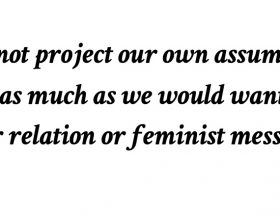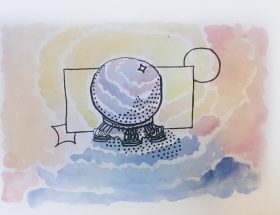“Tu media naranja”. Your half-orange. Despite not existing within the English language, this Spanish expression for soul mate isn’t completely meaningless when translated: it reflects the pervasive idea within the Western narrative of love as being equal to completeness, of humans as being born lacking a part of themselves which, paradoxically, can only be provided by someone else.
It is easy to confound the notion of soul mates with a romantic version of the social belief that we’re not good enough, one of the fundamental premises of Capitalism. But Capitalism is based on (unachievable) self-improvement, on the creation of flaws which can be pinpointed and individually (economically) tackled– soul-mate-love isn’t. It constructs an abstract hole that is meant to be filled but, unlike with ‘imperfect’ body shapes or ‘scruffy’ fashion sense, it doesn’t provide a guide on how to fix it. There is no membership to buy, no magazine to flip through. Yes, there are dating sites and alluring aftershaves, but those are simple reiterations of the original premise: there is someone out there that will make life perfect; it is your mission to find them.
This notion of love is very clearly Platonic. It presents an ideal form of love, one which, presumably, we should all aspire to; one which comes in the shape of a single person, and very well defined experiences (romantic walks, irrational laughter, linking eyes in the middle of a crowd…). Plato never argued that the forms could exist on this Earth, however; they were (just bear with my philosophical ramblings for a second) separate from our physical realm, ideas that we retained in our minds, and on which the contents of our world were imperfectly modeled. The societal conception of soul-mate-love has excluded this part of the theory from its equation. And, thus, in comes the obsession.
Society is fascinated by soul-mate-love. Crazy, ill, drunk in love. We refuse to accept all of the chance-factors that come into play, our animal biology acting at the sight of a person of the gender we believe (the spectrum of gender and attraction opens up an entirely new conversation) we are attracted towards. Think about it. The last person you thought you fell in love with (if you have, or know you have, because, what is falling in love? being in love?) just happened to be the best option your brain and instincts subconsciously considered. Had there been someone slightly more attractive, clever or funny, someone you happened to see around often or had friends in common with, you might have fallen in love with them instead. Or maybe not. Maybe had you been in a different mindset or mood, had your life been affected by a turn of events, you wouldn’t have fallen for either of
This isn’t to say romantic love is dead. As much as my inner skeptic would love to scream to the heavens that we can only hope for filling our existentialist voids with meaningless interactions, I don’t believe it to be true. The random delicacy of a relationship can be glorious– but only for a period of time. It may be two months; a year; fifteen. Regardless, the very nature of romantic love means that it will die or transform (usually into a convenient, marriage-friendship), because the conditions that gave birth to it will change. Us, them, the environment, the air, everything.
The dream of soul-mate-love chains us to a fear of relationships ending, hooks us to the intoxicating liquor of hunting for one. We blame ourselves, because shifting our perception of love seems to shatter the concept into a million shards, to turn on the volume of the Wellian chant– we’re born alone, we live alone, we die alone.
But that’s the beauty of it, the magnificence we’re overlooking: independence. We have the power to survive on our own, to be happy and complete without anyone else, yet we choose to share our existence with others (this applies to all kinds of love). Dependency shouldn’t be the goal; time becoming emptiness when our significant other is not around, our lives turning into a picture torn in half after a relationship should be what scares us. We shouldn’t look for soul-mates, but hope for complements, for human additions that help us find the traces that are already within us to make us better.
Our obsession with love is dangerous. Our desire to understand a complexity and dream we have constructed ourselves breeds unhappiness, lack of confidence, neglect of the self– it distracts us. It kidnaps our attention away from bigger goals and dreams, it lures us into focusing on something which is not under our control. We find ourselves marrying someone who happens to be there at around the age at which we are told we should be marrying our soul-mate; we wake up at the age of forty realizing we have spent adult life making love to a person who we stopped loving years ago; we slam a divorce against their face because we see it as our failure, as the lie of what once looked as the promise of the ideal. We are bitter, because we feel we will die without tasting our finished selves.
I say, quit your soul-mate-love addiction. When Da Vinci painted the Mona Lisa, he didn’t hope that the right tourist would go and sit by her to complete her. After the last brushstroke, even when alone in a dark room, she already was.




